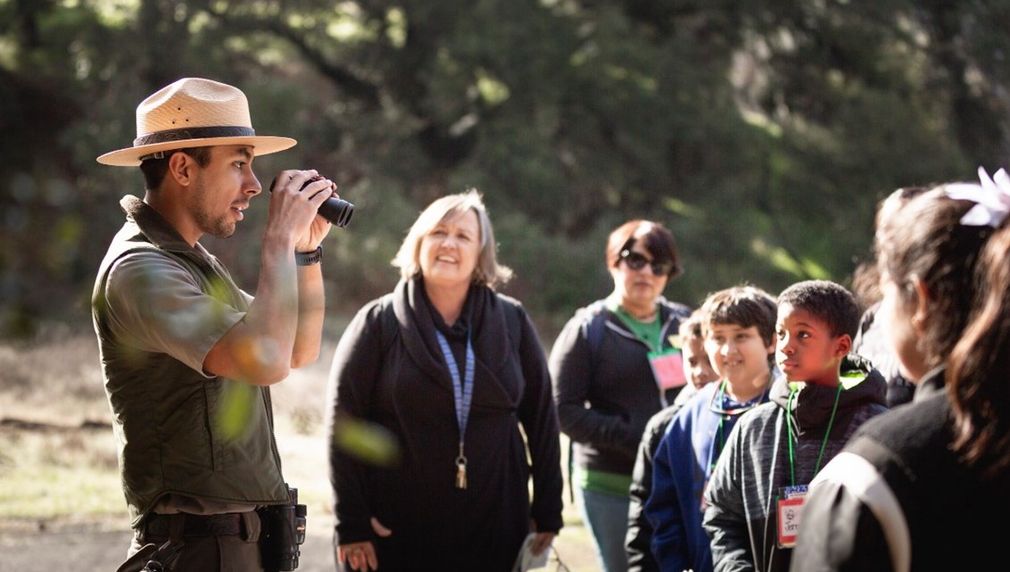Every Kid Outdoors: Nature Education for All
Every Kid Outdoors (EKO) is a transformative initiative that seeks to ignite a lifelong love for nature in Title 1, grade 4 students from underprivileged communities in Los Angeles County. Through a blend of virtual and in-person experiences, EKO kindles a sense of wonder, nurture environmental stewardship, and cultivates a deep connection to the natural world. By providing equitable access to parks and fostering a supportive learning environment, EKO empowers these young minds to explore and develop a profound sense of belonging in nature.

What is the primary issue area that your application will impact?
Green Space, Park Access, and Trees
In which areas of Los Angeles will you be directly working?
County of Los Angeles
City of Los Angeles
Other:: Santa Monica Mountains in Los Angeles County
In what stage of innovation is this project, program, or initiative?
Expand existing project, program, or initiative
What is your understanding of the issue that you are seeking to address?
The Every Kid Outdoors (EKO) program passionately addresses the pressing issue of unequal access to green spaces by exposing underprivileged children in Los Angeles to the transformative power of nature. By immersing these young minds in the awe-inspiring beauty of the outdoors, we strive to create a profound impact on their socio-emotional well-being, fostering resilience, joy, and a deep sense of belonging. Our mission is to break down barriers, ensuring that every child, regardless of their socioeconomic background, can freely explore, play, and forge lasting connections with nature, unlocking the boundless benefits it offers for their holistic development. Additionally, we recognize the vital importance of STEM education and empower these children with hands-on learning experiences, sparking their scientific curiosity, fostering critical thinking skills, and inspiring the next generation of innovators and environmental stewards.
Describe the project, program, or initiative this grant will support to address the issue.
Every Kid Outdoors (EKO) offers engaging and educational experiences to Title 1, grade 4 students from Los Angeles County, providing access to nature and cultural resources for students who may face barriers in experiencing these environments. The program has been adapted to offer a combination of live, online, and in-person programming. It seeks to alleviate the burden on teachers by conducting pre-visit programming themselves, reducing the amount of preparation required for field trips. Asynchronous post-visit resources, such as reflection prompts, interpretive videos, and craft activities, are provided to enhance learning beyond the field trip experience. For schools located far from the program sites, distance learning programs are available. Synchronous virtual programs are offered by both California State Parks (CSP) and Santa Monica Mountains National Recreation Area (SMMNRA/SAMO Fund). The program emphasizes diversity, equity, and inclusion, focusing on inclusive storytelling and incorporating diverse perspectives and narratives. Activities are co-created with Latinx 4th graders, and partnerships with tribes contribute to video projects and interpretive initiatives at park sites. Teacher engagement and support are prioritized, with workshops, resources, and assistance provided. The program expands teacher resources and offers resource-based training based on feedback. The program acknowledges the healing power of parks and aims to revive students' well-being.
Describe how Los Angeles County will be different if your work is successful.
The success of EKO means that every child in LA, regardless of their socioeconomic status, will have equitable access to nature and could gain a deep appreciation for the environment. The intended impact is multifaceted. First, it seeks to inspire a generation of environmentally conscious individuals who understand the importance of protecting natural resources and working towards a sustainable future. Secondly, the program provides students equal opportunities to connect with nature and engage in transformative learning experiences. By targeting Title 1 schools and prioritizing under-resourced communities, EKO aims to bridge the nature gap and ensure that no child is left behind in accessing the benefits of STEM and outdoor education. As the program demonstrates its impact, it has the potential to serve as a model elsewhere. LA could serve as a catalyst for nationwide change, ensuring that every child has the opportunity to forge a lifelong connection with the natural world.
What evidence do you have that this project, program, or initiative is or will be successful, and how will you define and measure success?
The EKO Team monitors school participation through a combination of research, targeted outreach, and tracking enrollment. We actively invite schools from various districts to participate, especially prioritizing Title 1 schools. We also engage in marketing efforts to attract new schools, meeting regularly to review the results and assess the need for additional strategies. By actively monitoring enrollment, we can continue to adapt their marketing strategies, prioritizing Title 1 schools, and leveraging partnerships to expand program participation and reach a broader audience of students. Additionally, educator input and feedback play a crucial role in program development. We value the insights of educators and actively seek their input through discussions, feedback sessions, and workshops. Teacher feedback has been positive, indicating that the virtual programming at SAMO has been successful in engaging students and stimulating participation.
Approximately how many people will be impacted by this project, program, or initiative?
Direct Impact: 23,000
Indirect Impact: 3,000
Describe the role of collaborating organizations on this project.
- The SAMO Fund provides administration, fundraising support, and grant management for programming. SAMO staff help to recruit and train interns and volunteers, schedule programming and coordinate transportation and course materials. - The National Park Service provides educational and staff leadership to manage the team and the program budgets. Educational staff manages interns/volunteers, conducts distance learning and hybrid programs, and supports teacher and program needs. - CA State Parks also provides educational and programmatic staff leadership to manage the team and the program budgets. Educational staff manages interns/volunteers and the distance learning programs. - The Resource Conservation District provides additional educational staff student transportation logistics.